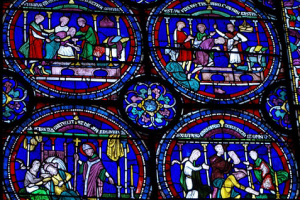
Secularization and Sacralization
The Christian world-view is trapped in a massive tug-of-war. On the one hand, secularization undermines the very foundations of right thinking. Sacralization, on the other hand, is at the heart of restoring Biblical perspective.
Secularization
What is ‘secularization?’ In simple terms I would define it as “the process of removing religious significance from any aspect of life.” This is the modern trend, powerfully active for several hundred years.
Often, religious significance exists, but only in a private, ‘spiritual’ aspect of life. In other words, life is compartmentalized. There is work; there is family; there is relaxation; and then – quite separate from all the others – there is religion. This leads to the Sunday-only Christian, and it makes men practical atheists.
Secularization is the pet trend of our society. It keeps prayer out of school, morality out of law, and spiritual considerations out of practical decisions. It is strikingly exhibited in the case of Kim Davis, who was given only one option: to perform her job without her religious views ‘interfering.’
Yet there is nothing ‘new’ about secularization. It is exactly the problem of the Jews in the time of Isaiah. The nation was very religious – but only on the Sabbath, when they offered expensive sacrifices. The rest of the week was busy with extortion, injustice, and evil.
Sacralization
If the world advocates secularization, then Christians should promote sacralization. I think that this is a good term to indicate the opposite of secularization; we could define it as “the process of injecting religious significance into any aspect of life.”
When we apply sacralization, we begin to view every aspect and role of life as deeply ‘religiously-significant.’ Work is no longer drudgery – it is service to the Lord. Relationships are no longer between individuals only – they exist in the presence of God. Even the simplest actions become spiritually important.
This is exactly what the Bible teaches. Paul demonstrates how labor is a God-directed activity[1] and teaches that marriage is a spiritually symbolic union.[2] Solomon concluded that every action must be lived in light of eternity.[3]
A pharmaceutical manual from 1764 demonstrates sacralization in action. In the manual, Thomas Green, a physician, wrote a note to his apprentice, Thomas Wallis, reminding him that even his medical profession was religious significant. He charged him to, “remember that God will surely bring you to judgment and that you must give an account of your conduct with lives of your patients.”
However, sacralization is much more than simply viewing every human role as spiritually important. It delves into our very understanding of the world. Everything has moral significance. Even the grass and trees are more than plants – they are part of the tapestry of creation by which God reveals his beauty and creativity.
It is high time for Christians to explicitly recognize and fight secularization. Through the process of sacralization, let us aim to be “renewed in the spirit of [the] mind.[4]”
[1] Colossians 3:22-25
[2] Ephesians 5:22-33
[3] Ecclesiastes 12:13-14
[4] Ephesians 4:23




[…] about knowledge. Reading culture thrives when people value knowledge. But as I have noted, secularization makes men practical atheists, and an atheistic culture only values present pleasures. Two thousand years ago, the apostle Paul […]
Sacralizarion…you, as founder and only member of the CADEL Society, are an excellent source for big words! Awesome post!